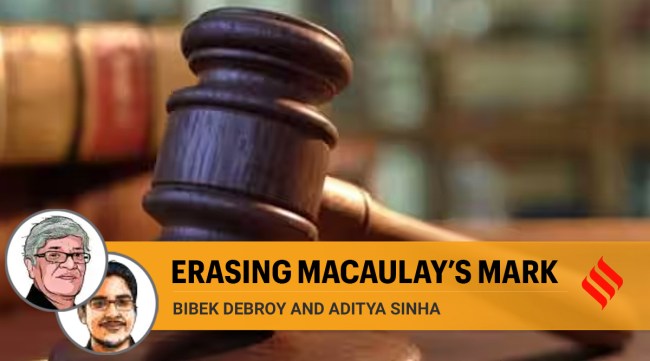Opinion BJP’s penal code reform: Erasing Macaulay’s mark
By adopting Bharatiya Nyaya Sanhita and related reforms, India is not just changing the numbers — it’s reclaiming its identity with flair
 The IPC had a total of 511 sections, in contrast to the 356 sections contained in BNS. (Representational Image)
The IPC had a total of 511 sections, in contrast to the 356 sections contained in BNS. (Representational Image)
Shri 420, Chachi 420, IPC 420 — such titles may lead the American observer down a path of herbal contemplation, conjuring images of something associated with cannabis culture. One would expect a cameo from Snoop Dogg in one of these movies. However, the Indian context, and sometimes South Asian, is different. The term “420” signifies a confident trickster in these movies. Section 420 of the Indian Penal Code, the inspiration behind these titles, is far from a gateway to an alternate state of consciousness. It, instead, refers to the very terrestrial crime of forgery and cheating (actually penalties, the crime is in 419). But not anymore.
Soon Section 420 of the Indian Penal Code, 1860 will be replaced with Section 316 of Bharatiya Nyaya Sanhita, 2023 (BNS). While Section 420 is only one such example, the Union government proposes to completely reform the criminal justice system. The IPC had a total of 511 sections, in contrast to the 356 sections contained in BNS. Along with this, the home minister introduced Bharatiya Nagarik Suraksha Sanhita Bill, 2023, to replace the Criminal Procedure Code, 1898. Furthermore, Bharatiya Sakshya Bill, 2023 will supersede the Indian Evidence Act, 1872. Many committees had recommended such changes.
It is a paradox of our criminal justice system that, even today, it bears the indelible marks of Lord Thomas Babington Macaulay. While the British themselves refrained from instituting a codified criminal justice system, they did not hesitate to draft such provisions for India, remnants of which persist to this day. There are five reasons why these bills are important.
One, erasing colonial legacies. This reason is clearly articulated. Before analysing any Bill, one should read the Statement of Objects and Reasons (SOR) that accompanies the Bill. To quote the SOR of the Bharatiya Nyaya Sanhita: “In the year 1834, the first Indian Law Commission was constituted under the Chairmanship of Lord Thomas Babington Macaulay to examine the jurisdiction, power and rules of the existing Courts as well as the police establishments and the laws in force in India… One of the important recommendations made by the Commission was on Indian Penal Code which was enacted in 1860 and the said Code is still continuing in the country with some amendments made thereto from time to time”.
Two, the move to reform these laws is not merely a legal imperative, but a philosophical one. It is a journey toward self-realisation. As John Locke would put it, there is a social contract between the government and the “governed”. Replacing outdated and unjust provisions with laws that reflect the ethos, needs, and aspirations of contemporary India is a stride towards fulfilling that contract.
Three, when societies progress, they require laws that mirror their current values and needs. Nowhere is this evolution more critical than in the criminal justice system, especially when countless individuals languish in jails. According to the National Crime Records Bureau, a staggering 77 per cent of India’s prisoners in 2021 were undertrials.
Jails, designed to contain a certain number of inmates, are bursting at the seams, their capacities stretched thin. Prolonged postponement in reforming the criminal justice system is an injustice in itself. An injustice to the countless undertrials, awaiting their day in court. An injustice to the victims who yearn for closure. An injustice to a section which would rather not end up approaching the criminal justice system. An injustice to the very citizens who place their faith in the pillars of democracy. The introduction of community service as a form of punishment in the BNS represents an innovative and humane approach to criminal justice. By targeting petty crimes, it serves as an alternative to imprisonment, focusing on rehabilitation and societal integration.
Four, the Indian criminal justice system’s inconsistencies have led to confusion. For example, Section 309 of the Indian Penal Code criminalises attempted suicide, while the Mental Healthcare Act of 2017 presumes such an attempt is due to severe stress and needs care instead of punishment. This conflict, while practically decriminalising the act, leaves Section 309 in the IPC, creating legal ambiguity and room for interpretation. The BNS has addressed this.
Five, the introduction of BKB is crucial modernisation of the criminal justice system, reflecting the significant changes in technology and society since 1872. It recognises the vital role of electronic information, allowing for digital records to be admissible and creating provisions for electronic appearances. This extends the scope of secondary evidence to include various forms of electronic and mechanical copies and introduces more precise and uniform rules for admissibility. In an age where information is increasingly digital, these amendments align the law with contemporary practices.
There is a backlog of almost 50 million cases stuck in Indian courts (including quasi-judicial forums). Two-thirds are criminal cases, concentrated in lower courts. An efficient resolution of these is a function of the definition of “crime” (for instance, 377 in IPC) and procedures for criminal trials. Pendency won’t come down only because of these three Bills. But they will help. Section by section, the Bills have redefined “crime” and made procedures simpler.
Before they become Acts, the Bills will be referred to a committee. In the process, one hopes there is more precision in definitions of “crime” still left somewhat vague. (Sedition is an instance, though the word is not specifically used.)
As we bid farewell to the time-worn Indian Penal Code, one can’t help but recall Raj Kapoor’s famous song, “Mera Joota Hai Japani”, from the movie “Shree 420”. Just as his shoes were Japanese and his hat was English, but his heart remained Indian, the legal reforms bring the quintessence of India back into its law books. No longer must India’s legal fabric dance to the whims of colonial times. By adopting the Bharatiya Nyaya Sanhita and related reforms, India is not just changing the numbers — it’s reclaiming its identity with a flair even the most confident trickster of Bollywood would applaud. If only Lord Macaulay could see us now, he might be humming a different tune!
Debroy and Sinha are, respectively, chairman and OSD, research, at the Economic Advisory Council to the Prime Minister







